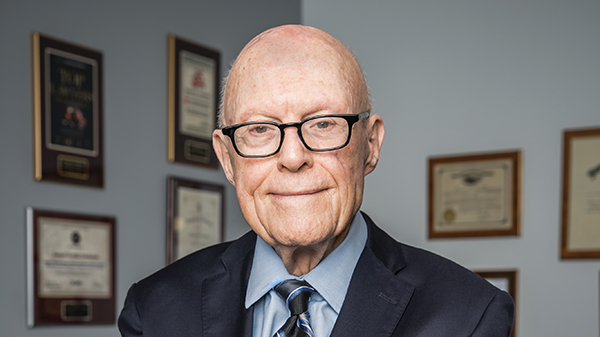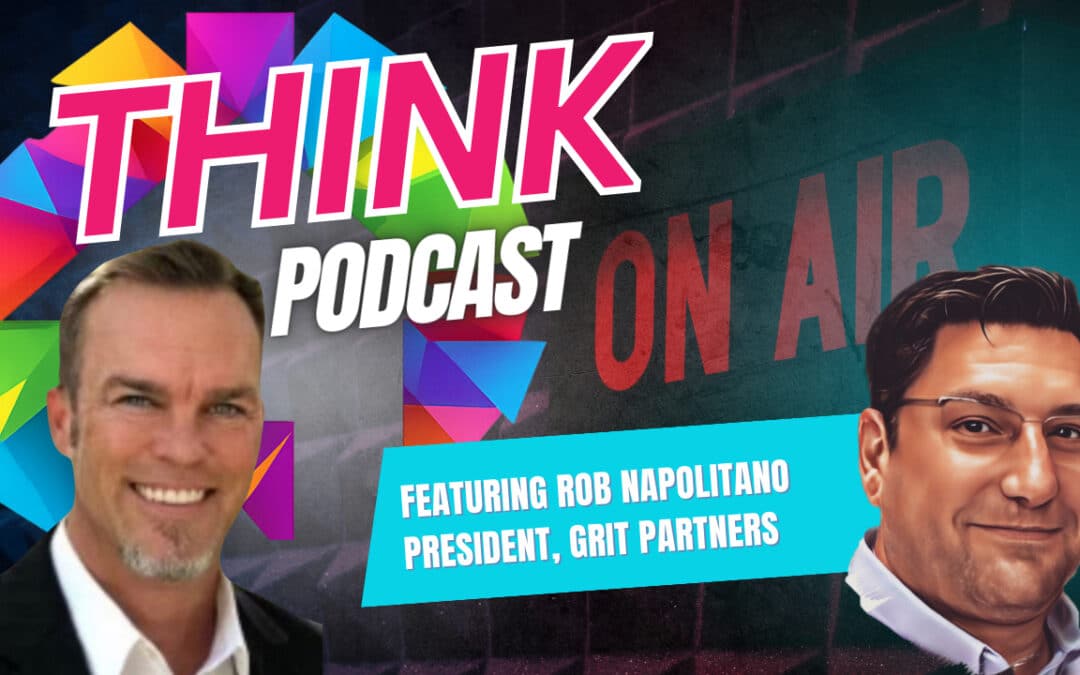Samuel K. Freshman, author of Principles of Real Estate Syndication, the industry-acknowledged “bible” on the topic, and founder of private real estate investment firm Standard Management Company, describes his life as “the story of the lady or the tiger.” The narrative, a short story written in the early 1880s by Frank R. Stockton, relates the tale of a fictional kingdom in which men facing punishment must choose between two identical doors, one hiding a lovely woman to be the man’s future wife and the other hiding a ferocious tiger who will eat him alive.
“People always think I’ve gotten where I have because of some kind of intellectual gift, but that’s just not true,” he said modestly. “My life has been the story of the lady and the tiger, and I’ve been lucky enough to walk through the door where the lady is every time I had to make a choice.”
Sixty years into a highly successful real estate investing career during which he has transacted hundreds of deals, taught thousands of investors, and leveraged millions of dollars in successful investments, Freshman seems to have a gift for making the right choices. However, it is inaccurate to say he has left everything up to chance. The author of multiple books, chairman emeritus of the Stanford Professionals in Real Estate (SPIRE), professor emeritus of real estate at the University of Southern California (USC) Marshall School of Business, and graduate of Stanford Law School says he “hates risk” so much that he has dedicated himself “to the only business I know of where you can’t lose if you have patience and don’t take on too much debt: real estate.”
Picking the Right Door Is Simple If You’re Willing to Listen
Perhaps the crucial point for Freshman’s success occurred when Freshman decided in his early adulthood to listen to people who knew more than he did. Specifically, he listened to his father.
“When I started out at Stanford, I was pre-med. I hated it, so I asked my father, ‘What should I do here? Half my friends are going to business school, and the other half are going to law school,’” Freshman recalled. “My father hated lawyers, but he wanted one in the family, so he told me to go to law school. I did.
“When I graduated, I didn’t know what kind of law to practice, so I asked my dad: court law? tax law? litigation? He said, ‘Go into real estate law. Real estate is where all the money is made in California.’ So, I did. I practiced law and invested every penny I made into real estate, and the rest is history.”
Of course, there is a little more to the history than that. In 1956, Freshman started out practicing law with a company that owned a great deal of real estate in Hollywood, California, at the time. “They actually had developed that land in the 1890s and 1900s, but when I started working for them, they were liquidating the company. I spent about a year learning everything there was to know about the history and development of Southern California, then I went out and opened my own law office,” he said. “Networking is one of my hobbies, you could say, so I joined a lot of organizations, met a lot of people, and the whole time I was practicing law I was putting every penny I could get into real estate.”
Sometimes, You Can’t Afford Not to Choose
Freshman describes his exit from the legal sector as something he could not afford not to do. “After about 25 years of acquiring property, I could not afford to keep practicing law instead of investing in real estate full-time,” he explained. After leaving the firm he had founded and managed since shortly after graduating from law school, he started buying 1920s high-rise office buildings, adding value to the properties, and then selling them. Along the way, he discovered an axiom that would propel him into the largely undocumented territory of real estate syndication.
“I realized that I needed to stop buying and selling. I had to start buying and keeping. When I first started in real estate, I was buying a building for $1 million and selling it for $2 million, thinking I was doing great. Today, they’re worth $100 million, but unfortunately, I didn’t keep them,” Freshman said. He went on to say that he had to start syndicating his deals of necessity, “because no developer ever has enough money.” He immediately began rectifying the situation by bringing on investors, partners, and sponsors to do increasingly large and profitable real estate deals.
In 1971, Freshman wrote the first of three editions of Principles of Real Estate Syndication, which summarized Freshman’s experiences successfully syndicating real estate deals using real-life examples, simple illustrations, and step-by-step instructions for syndicating any type of business enterprise, including, he said, “entertainment, oil and gas, timber, agriculture, manufacturing, restaurants, venture capital, and import and export.” In addition to real estate, Freshman also had invested in a small chain of theaters, owned a bank, and worked with his first employer, Jacob Stern & Sons, in a variety of other industry sectors.
“I liked banking,” he said fondly. “I figured out pretty quickly, though, that I could make more money at a bank as a customer than as a banker.” In another book, Never Old Enough to Know Better, Freshman details what he learned from his various investments and career pursuits over the years.
Always Looking for Opportunity
As Freshman continued to pursue bigger and more exciting deals, he began to develop a philosophy on life and business that hinged on two principles. “There are two things you must avoid in any type of real estate, but particularly if you want to effectively raise money to do really big deals,” he said. “First, never skip your due diligence. Second, don’t get too greedy. Those two mistakes will ruin you, and they will also ruin your reputation.”
Freshman places an extremely high value on reputation, citing his rigorous honesty with investors for much of his success at garnering funding for real estate deals over the years. The key, he said, is to never sugarcoat anything.
“Something I hear a lot these days at the height of an economic boom is the question, ‘Where will we be with this investment in three years?’” he noted. “Well, frankly, three years from now the property will probably be worth less than we’re paying for it now, and I’m going to tell my investors that. We’re due for another recession. I’ve been through six recessions in 60 years, and property always drops way down.”
Freshman doesn’t stop with that bleak assessment, however. He believes six decades in the business has given him the perspective his investors need to circumvent drops in property values and, if the deal is structured correctly, out wait the market’s downswings. “If you borrow too much to do a deal, then you lose the property. You lose everything,” he explained.
“However, as I tell my investors, I don’t borrow too much. I make my money with a pencil, and I am always looking at every way possible to squeeze as much money as possible out of every opportunity. If you stay with me in this investment for 10 years and have patience, we expect you to at least double your money and make six percent of your cash flow in the meantime.
“If you’ve got the time, you will always make money, assuming you bought right in the first place.” “I hate risk. Real estate is the only business I know of where you can’t lose if you have patience and don’t take on too much debt.”
Buying Right, And Buying Big
Freshman’s dedication to the concept of “buying to keep” really big pieces of real estate may seem inaccessible to newer investors or investors not already established in the hot real estate markets where Freshman and his company do many of their deals. However, he insisted that real estate syndication is not nearly as intimidating or complicated as many believe.
“When I’m teaching, I often meet new investors just starting out. They don’t have the capital to do big deals, and they think they need a couple million dollars if they want to invest in big deals like we do at Standard Management Company,” Freshman said. “I always tell them to go get themselves a partner. There are plenty of guys like me with all the money we need looking for property, and we’re far more interested in finding that property than working with somebody who will give us a couple million dollars. If your deal is good, then you will find someone to put the money in.”
Because the suggestion often intimidates new investors, Freshman told a story to illustrate the importance of finding that first partner. “I did not have a lot of my own money when I started, so I worked with a wealthy guy at the country club who was looking for ways to invest money. He agreed to be a co-sponsor on the deal with me, which was really important. That first, vital partnership allowed me to say to investors, ‘The sponsors are putting in $2 million, or 20 percent’ instead of having to say, ‘I’m putting up one percent.’ Your investors will be satisfied that the sponsors are putting in 10 or 20 percent of the deal, and it usually will not matter as much how the initial money is split as long as you, the syndicator, have a good amount of your own money in there.”
A Legacy of Experience
After 60 years in the business, Freshman has a lot of perspective on today’s real estate market. Very little surprises him. Today, Standard Management Company offers property management and asset management services, runs a full-service brokerage, and serves in an advisory capacity to many of its investors in addition to investing in multifamily and commercial real estate and lending.
“We were involved in the management and leasing of approximately 1 million square feet of office properties shortly after our founding,” Freshman observed. “By the 1970s and 1980s, we had acquired more than 6,000 multifamily units, were operating industrial properties throughout the U.S., and had large projects in Burbank, Santa Maria, Ontario, and Sacramento, California; New Orleans, Louisiana; Nashville, Tennessee; Atlanta, Georgia; Columbus, Ohio; Houston and Dallas, Texas; and Lawton, Oklahoma,” he said proudly. He added that the company still actively seeks acquisition opportunities in multifamily and retail property and land investments in the western U.S. (see image below to learn more about Freshman’s favorite markets).
Freshman and his company are dedicated to educating investors at all levels, and the company hosts two annual conferences in southern California in addition to a vast array of conferences, webinars and podcasts Freshman specializes in tactics to maximize the opportunity in every deal, including strategic uses of 1031 exchanges and other tax-advantaged strategies. “There is always a better way to structure a transaction,” he said.
“Why Bigger Is Better”

Samuel Freshman is known for buying big, but he insists that hard numbers nearly always back up the decision to go for larger properties over smaller when investing: “If you buy a 50-unit building, you have to have a manager. You are probably going to pay that manager about $50,000 a year to manage that property. Say you buy a 200-unit building. You still only need one manager, and you pay that manager about $15,000 more a year, $65,000, but you are generating four times as much revenue. “Of course, that is a very simplified example, but the math almost always works out. You can make a lot more money by putting a lot of people together and buying something big than you can buying [something smaller] by yourself. “There is great savings in volume. That is why someone who gets rich in real estate usually will have gone after the larger properties. You get successful investors who are very patient and buy a lot of individual properties, but I believe the most success is in large properties.”
A Reputation As “Straight Shooter”
Early in his career, Samuel Freshman made some decisions that he refers to as “lucky.” In reality, they might be better characterized as “honest, forthright, and reliable,” with possibly a small hint of “I told you so.” Freshman dedicated himself to honest dealing with his early partners, and he also dedicated himself to making sure they knew when they had missed an opportunity – and, whenever possible, giving them a second chance. “For 30 years, I was partners with Northwestern Mutual Life Insurance Company. In a lot of the deals I did, 90 or 95 percent of the money in the deal was theirs. I started out with them; it was another instance of choosing the right door,” he said. When Freshman took his first deal to Northwestern, the two parties formed a successful partnership that served as a foundation for a long-term relationship. However, Northwestern did not always “bite” on Freshman’s opportunities. When that happened, he used a unique method to demonstrate his dedication to their relationship while highlighting the opportunity they had passed up. “I wanted to show that I was really on their side, so of course I always took things to them first.
If they passed, though, and then later I was in a position to buy something else in close proximity to the deal they’d passed up, I would take it to them first again. If they passed on that, then I would go ahead and either raise money elsewhere or use my own money to tie up the deal so that I could move forward and make money on that investment. But I always gave them the chance to get involved even when I could get anyone to partner with me that I wanted. “After I did that two or three times, they knew that they could trust me. They were pretty likely to invest in anything I thought was a good opportunity because they knew that I was a straight shooter and loyal.
 They couldn’t believe someone would give them a chance to come back in after the deal was all set up. If you treat people right, they’ll treat you right,” he said. Freshman concluded with an anecdote from his father, whose advice started him off on the path to real estate syndication decades ago. “My father said that the most important thing to protect is your reputation. I wouldn’t fight a partner for the last penny, and I always treated my partners fairly.” Sometimes, he was more than fair. In one deal that did not do as well as expected, a group of retired investors lost a great deal of money in the process. “I paid them all back, even though I had no legal obligation to do so,” Freshman recalled. “When that went around, it ended up opening a lot of doors for me,” he said pragmatically.
They couldn’t believe someone would give them a chance to come back in after the deal was all set up. If you treat people right, they’ll treat you right,” he said. Freshman concluded with an anecdote from his father, whose advice started him off on the path to real estate syndication decades ago. “My father said that the most important thing to protect is your reputation. I wouldn’t fight a partner for the last penny, and I always treated my partners fairly.” Sometimes, he was more than fair. In one deal that did not do as well as expected, a group of retired investors lost a great deal of money in the process. “I paid them all back, even though I had no legal obligation to do so,” Freshman recalled. “When that went around, it ended up opening a lot of doors for me,” he said pragmatically.


























0 Comments